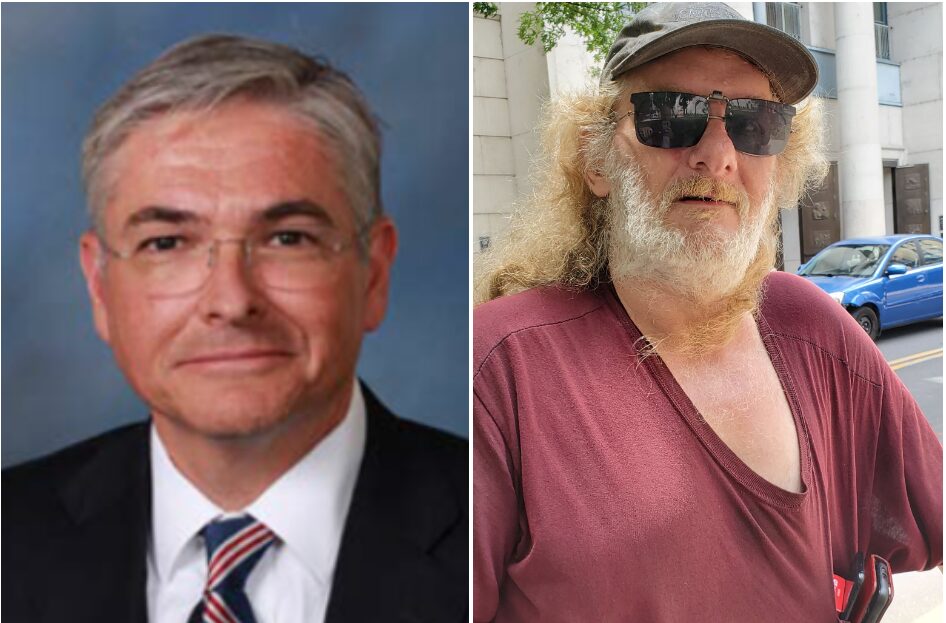
U.S. district court judge Judge Charles E. Atchley Jr., left, dismisses a lawsuit against a cop by Ed Soloe of Alcoa, Tenn. dismissing out of hand Mr. Soloe’s claims that he wasn’t driving or operating a motor vehicle when he was arrested traveling on a suspended license and without insurance. (Photos U.S. courts system, David Tulis)
On April 17, 2022,Officer James P Fisher of the Vonore, Tenn., police department pulled over the minivan with Ed Soloe behind the steering wheel and Mr. Soloe’s wife, Allison, in the guest seat. A daughter sat behind.

James P. Fischer, Vonore TN cop on LinkedIn
Mr Fisher wrote Mr. Soloe a citation under § 40–7-118 and then had his car towed for lack of insurance pursuant to the Tennessee financial responsibility law of 1977, sect 139.
On Oct. 5, 2022, the Monroe County grand jury indicted Mr Soloe for violating T..C.A. § 55-50-504 that criminalizes anyone “who drives a motor vehicle within the entire width between the boundary lines of every way publicly maintained that is open to the use of the public for purposes of vehicular travel *** at a time when the person’s privilege to do so is canceled, suspended, or revoked,” such person committing a Class B misdemeanor.
“Driving on suspended,” in other words.
The law says, a person who drives a motor vehicle within the entire width between the boundary lines of every way publicly maintained that is open to the use of the public for purposes of vehicular travel,” indicating the statute recognizes that the roads are open to the public for purposes of vehicular travel, with the public free to use the roads for pleasure, private business, exercise of rights and many other blessings of liberty
On Oct. 30, 2023, Mr. Soloe pleaded no contest and was sentenced to 6 months unsupervised probation.
Soloe v. Fischer case no. 3:23-CV-00382-CEA-JEM
“Soloe disputes the validity of the charge against him,” says Judge Charles E. Atchley Jr. “The relevant Tennessee statute, in Soloe’s view, only requires those who operate commercial vehicles to obtain driver’s licenses. Soloe contends that he did not need a driver’s license while operating a non-commercial vehicle. Moreover, Soloe disputes any notion that he was required to maintain car insurance. He claims that for non-commercial vehicles, insurance is only required following an accident” (internal citations omitted).
‘Sovereign citizen’ prejudice
Judge Atchley’s starting point is typical of jurists across the U.S. who have received training on how to dismiss constitutional arguments as dangerous “sovereign citizen” arguments. City court judges in the Tennessee judicial conference Nov. 6, 2022, were meeting in Franklin, Tenn., to hear a lecture on “sovereign citizens,” so that they could “rule and run” against them without having to listen to any argument or consider any material fact.
The prejudice in legal form rejects that motor vehicle enforcement is privilege management, the regulation of privilege. A privilege is a license to perform an act that is unlawful to do apart from privilege. Driving a motor vehicle, like psychiatry, podiatry, therapy, real estate brokering, private investigating, pest control, is a profession. These others are in Title 63, professions, businesses and trade.
The occupation of driving a car — to carry goods and passengers for hire — simply is in a separate title, Titles 65 and 55, as its regulations are voluminous. Virtually every adult has applied to be in that line of regulable, taxable business. The applications are voluntary. But everyone knows police will harass a person mercilessly if he uses the roads privately, apart from commerce.
Judge Atchley’s premise is commercial. All use of “the roads are open to the public for purposes of vehicular travel” necessarily is in commerce, exclusively in commerce and for hire, and no right can be exercised thereon.
In other words, there is no right of ingress or egress. No right of free assembly under the federal first amendment or Tenn. const. Art. 1 sect. 23. “That the citizens have a right, in a peaceable manner, to assemble together for their common good *** .” No right for free exercise of religion. No right of the press. In other words, in the eye of well-trained judges such as Mr. Atchley, the road is no place for rights, only for business.
Mr. Soloe — just read the ruling here — is wrong because he claims he wants to drive without a license, registration or insurance. That’s not at all the claim of the plaintiff, not at all. Where Mr. Soloe sees a distinction between private and public, the court doesn’t.
‘Hallmark of sovereign citizen ideology’
“Soloe’s claims for damages are all premised on his view that he is not required to maintain a valid Tennessee driver’s license,” the court rules.
Soloe does not specifically identify as a sovereign citizen in his filings, but his arguments — particularly those pertaining to driver’s licenses and car insurance — bear the hallmark of sovereign citizen ideology, Sposato v. Carey, No. 5:23-cv-364, 2024 WL 637423, at *4 n.5 (N.D.N.Y. Feb. 15, 2024) (finding that the plaintiff’s contentions that he did not need a driver’s license or vehicle registration provided “classic examples of Sovereign Citizen ideology”); Johnson v. Weare Police Dep’t, No. 12-cv-032, 2013 WL 5740453, at *2 n.2 (D.N.H. Oct. 23, 2013) (explaining that the plaintiff’s “belief that he needs neither a driver’s license nor a vehicle registration is consistent with those of the sovereign citizen movement”).
And courts routinely dismiss these sovereign citizen arguments because they are “frivolous and a waste of court resources.” Joyce-Simpson v. AT&T Mobility, No. 1:23-cv-1216, 2023 WL 8248061, at *3 (W.D. Tenn. Nov. 7, 2023) (citation omitted). The Sixth Circuit has considered and rejected arguments similar to Soloe’s. In Dunn v. Post, for example, the Sixth Circuit affirmed the district court’s order dismissing the plaintiff’s complaint as frivolous and for failing to state a claim. Dunn, 2022 WL 1297586, at *2. The plaintiff in that case, like Soloe, claimed that he was not subject to the state’s driver’s license and proof-of-insurance requirements. Id. at *1. Rejecting the plaintiff’s argument, the Sixth Circuit concluded that he “identified no constitutional right that would allow him to operate a motor vehicle in Michigan without a valid driver’s license, registration, or proof of insurance, nor has he shown that any part of his underlying action states a plausible claim for relief.” Id. at *2. The facts here warrant the same conclusion reached in Dunn — namely, that Soloe’s claims for damages must be dismissed as frivolous. Soloe’s claims for damages hinge on his view that he is exempt from the requirement under Tennessee law that all drivers maintain a valid driver’s license and proof of car insurance. But Soloe’s view is plainly misguided.
It is well-established that states may enforce traffic laws, including those that require individuals to hold valid driver’s licenses before operating a motor vehicle. See United States v. Warfield, 404 F. App’x 994, 996 (6th Cir. 2011) (noting that the defendant could not contest that “state police could properly arrest him for driving on a suspended license”); see also Wolshlager v. Gast, No. 1:19-cv-293, 2019 WL 2250752, at *1 (W.D. Mich. May 2, 2019) (rejecting the plaintiff’s argument that he was exempt from the state law requirement to maintain a valid driver’s license). Soloe’s claims for damages, which are part and parcel of his flawed interpretation of Tennessee traffic laws, rely on “indisputably meritless legal theories” and must be dismissed as frivolous. Brand, 526 F.3d at 923 (citations and internal quotation marks omitted). [emphases added]
The Soloe case is stifled before it is served on cop Fischer, waylaid by the magistrate who flags it for violating the Younger doctrine, a protective shield state cases have from federal interference. Mr. Soloe had sued before the criminal prosecution had been settled.
System is stacked
Judge Atchley’s analysis is a warning to me as I review the law and precedents, targeting the Jim Crow system of enforcement, namely “traffic stops” done ultra vires and on rebuttable presumption.
I have a pending grievance fixing to enter into the fray that counts Ed Soloe a victim. My Nov. 22, 2023, arrest for a damaged taillight is premised on Hamilton County sheriff’s department’s commercial enforcement of Tenn. code ann. § Title 55, motor and other vehicles, and Title 65,, chapter 15, carriers.
The source of its authority under state law is difficult to discern, if not entirely absent. That HCSO ignores the Tennessee rules of uniform administrative procedures act in dealing with me for a technical infraction, and criminalizes the infraction, is unjust and violent. Its case is without probable cause, and is dismissed. An admitted civil tort. A crime, as I alleged in a criminal complaint filing with DA Coty Wamp.
That dark morning I am traveling on radio station business in Hixson, heading south on state highway 153. Deputy Brandon Bennett insists I am not involved in commerce. So why the arrest? Why am I jailed, money stolen out of my wallet?
The evil, pernicious American police state system of violence against everyone, of kidnapping people off the street who have committed no crime.
Mr. Soloe, an unemployed mechanic and handyman, is right in his analysis of the privilege, and the judges are wrong. The jurists are wrong by agreement to maintain commercial government, turning the people into bread, into negotium. The sovereign citizens are not in their worn-out vans and cars on the roads. But in black robes.


“The law says, a *person who*- *drives*- a *motor vehicle* within the entire ……
So once again, a man attempting to live within Tennessee is assaulted, deprived of his Liberty, and denied justice by a Municipal corporation pretending to govern over him by threat of violence, and coercion that he has reduced himself to a corporate entity, having no Lawful rights as “one of the People.”
I can understand why the corporation goes to so much trouble to coerce People to simply “hear and obey,” so that IT can be “allowed” to take up where King George had to leave off from his despotism.
Because here the corporation did not prove a single element of the charges in order to extract acquiescence from the man, IT has no Lawful standing with.
Always challenge jurisdiction, because until you yield it, the corporation doesn’t have it, lawfully.